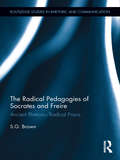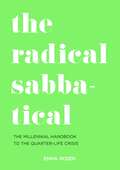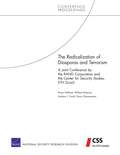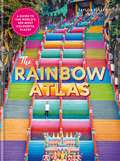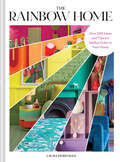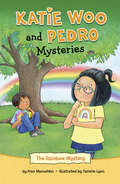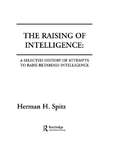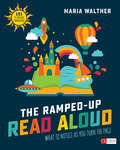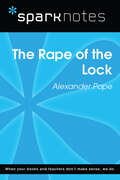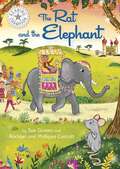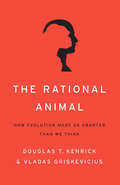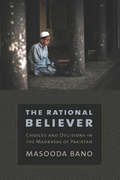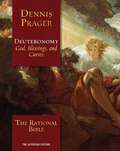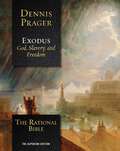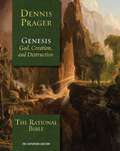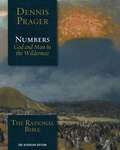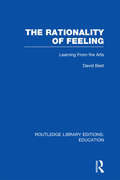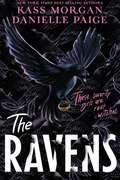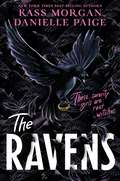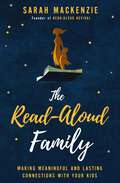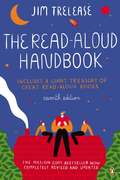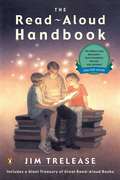- Table View
- List View
The Radical Pedagogies of Socrates and Freire: Ancient Rhetoric/Radical Praxis (Routledge Studies in Rhetoric and Communication)
by Stephen BrownSituating contemporary critical praxis at the intersection of the social, the political, and the rhetorical, this book is a provocative inquiry into the teaching philosophies of Plato’s Socrates and Paulo Freire that has profound implications for contemporary education. Brown not only sheds new light on the surprising and significant points of intersection between ancient rhetoric and radical praxis as embodied in the teaching philosophies of Socrates and Freire, using the philosophy of each to illumine the teaching of the other, but uses this analysis to lead contemporary education in a bold new direction, articulating a vision for a neo-humanist pragmatism. The book draws on the post-Freudian theories of Jacques Derrida, Peter Brooks, and Otto Rank, as well as on the neo-pragmatism of Cornell West to craft a new radical pedagogy configured to the realities of "post flash-crash" America. In the process, it discovers a space for a much broader application of Freire’s teaching philosophy than previous works, moving beyond a narrow focus on "liberatory" pedagogy or "teaching resistance," toward a neo-humanist pragmatism emphasizing interactive learning, problem-posing analysis, and civic engagement. Brown crafts a social-epistemic praxis that fuses the pedagogies of Freire and Socrates, joining the analytical, the ethical, and the political as part of an inquiry and intervention into the real, the good, and the possible that poses problematic aspects of contemporary reality in a search for the program content of a Pedagogy of Social Change.
The Radical Sabbatical: The Millennial Handbook To The Quarter Life Crisis
by Emma RosenA book for everyone who is tired of that Sunday night dread...Just over a year ago, aged 24, Emma left her job with the Civil Service to spend a year experiencing 25 different careers before turning 25. Aiming to promote career fulfilment and advocate for more diverse career education, Emma was overwhelmed by the response and the lessons she has learnt have been invaluable. Interweaving New You and self-help, THE RADICAL SABBATICAL blends the extraordinary perspective gained from experiencing twenty-five different careers in a year, with practical advice for those who want to make a career change and for those who don't even know where to start. Divided into three sections – 'How To Learn What Makes You Happy', 'How To Get 25 Jobs' and 'How To Turn Indecision Into Opportunity' – THE RADICAL SABBATICAL addresses core issues and lessons learned from trying so many careers. Offering practical advice in an engaging and accessible manner, it will inspire readers of all ages to take control of their lives and give them the confidence to make the changes that are right for them.
The Radical Sabbatical: The Millennial Handbook To The Quarter Life Crisis
by Emma RosenA book for everyone who is tired of that Sunday night dread...Just over a year ago, aged 24, Emma left her job with the Civil Service to spend a year experiencing 25 different careers before turning 25. Aiming to promote career fulfilment and advocate for more diverse career education, Emma was overwhelmed by the response and the lessons she has learnt have been invaluable. Interweaving New You and self-help, THE RADICAL SABBATICAL blends the extraordinary perspective gained from experiencing twenty-five different careers in a year, with practical advice for those who want to make a career change and for those who don't even know where to start. Divided into three sections – 'How To Learn What Makes You Happy', 'How To Get 25 Jobs' and 'How To Turn Indecision Into Opportunity' – THE RADICAL SABBATICAL addresses core issues and lessons learned from trying so many careers. Offering practical advice in an engaging and accessible manner, it will inspire readers of all ages to take control of their lives and give them the confidence to make the changes that are right for them.
The Radicalization of Diasporas and Terrorism: A Joint Conference By The Rand Corporation And The Center For Security Studies, Eth Zurich
by Bruce Hoffman William Rosenau Doron ZimmermannCertain Diaspora communities, frustrated by a perceived war against the Muslim world, have turned against their adopted homelands, targeting the government and its people by supporting terrorist attacks against Western countries through recruitment, fundraising, and training. The problem is exacerbated by the open borders of globalization. Emerging threats must be identified without alienating Diaspora communities and thereby playing into terrorist hands.
The Rainbow Atlas: 500 of the World’s Most Colourful Places
by Taylor FullerDiscover 500 amazing global adventures for colour seekers. From natural phenomena and architectural wonders to art installations and cultural events, The Rainbow Atlas takes you around the world from one vibrant landmark to the next. It explores locations such as the extraordinary pink lakes of Western Australia, the brightly coloured fishermen's houses of Burano in Italy, the UNESCO World Heritage Site of the old town in Antigua, the tulip fields of Holland, Bangkok's famous Damnoen Saduak floating market, and the otherworldly landscape of the Rainbow Mountains in Zhangye Danxia, China. Each entry is organised by latitude, and details the best time of year to visit so you can start to plan your travels. It's the perfect gift for a jet-setting friend, or even someone who likes to explore the world from the comfort of their home.
The Rainbow Home: Over 200 Ideas and Tips for Adding Color to Your Home
by Laura PerrymanBring a rainbow of joy into your life with colorful home design and decor inspiration. The Rainbow Home features hundreds of easy DIYs and tips from leading home influencers for homeowners, renters, and anyone inspired by color.Many homes have color in them, but a rainbow home is one that uses color in a particular way. This could be a bright pop of surprising color, a room that pairs clashing colors, an intense use of pattern, or a clear rainbow effect. The overall feel is that the color is there to bring joy and to create a home that is extremely personal and unique. Like Pinterest at your fingertips, The Rainbow Home is the go-to reference book that makes it easy to define your own rainbow style and add color anywhere in your home. Divided by area (house front and doorways, hallways and stairs, living spaces, kitchens, eating and entertaining, sleeping spaces, bath and relaxation, home offices and craft rooms, storage solutions, and outdoor space), each chapter includes: Lots of clever DIYs, purchasable ideas, and photographic inspiration. An exploration of the three distinct “types” of rainbow colors: dopamine brights (intense bold and joyful colors), playful pastels (nostalgic and sweeter chromas), and uplifting neons (electric and punchy hues). A deeper dive into specific colors, breaking down the benefits of each, how to choose which shade is right for you, and a color pairing guide. Feature profiles on notable décor personalities, taking a peek into their colorful homes and sharing their advice, including such luminaries as Evie Kemp (@eviekemp), Stasia Buckle (@stasiabuckle), Maye Ruiz (@mayeruz), Lizzy Hingham (@lizzyhigham_interiorstyling), Shareen and Martin (@happyvillageinterior), and Sisi Alfred (@homewithsisi). A brilliant interior design coffee table book, The Rainbow Home is outstanding as a self-purchase for color enthusiasts, a housewarming present, or a handy guidebook for designers, stylists, color consultants, decorators, and creatives of all types.THOUSANDS OF DÉCOR IDEAS: Over 600 images with corresponding ideas and tips are included, so you’ll never run out of inspiration for your home. LEADING DÉCOR EXPERTS: This irresistibly aesthetic book features the dazzling homes and interiors of top #rainbowhome influencers who share their seasoned advice for making your home feel fun and colorful. RENTER-FRIENDLY TIPS & TRICKS: Much of the book’s advice is adaptable to a wide variety of spaces and budgets. Decorative paint and décor can be temporary or easily removed, so you don’t have to sacrifice your deposit to have a colorful home!Perfect for: Anyone interested in home décor and DIY ideas, maximalism, and design New apartment, house, or condo renters or owners looking for decorating inspiration Host or hostess gift-giving Fans of rainbows and colorful textiles, art, and collectibles
The Rainbow Mystery (Katie Woo and Pedro Mysteries)
by Fran ManushkinKatie’s dad has a special ring that shines like a rainbow. But he loses it while he, Katie, and Pedro are enjoying a beautiful day outside. Pedro and Katie work together to search for the ring. They try collecting clues and observing their surroundings. Will their detective work lead them to the rainbow ring?
The Raising of Intelligence: A Selected History of Attempts To Raise Retarded Intelligence
by H. H. SpitzThe history of attempts to raise the intelligence of mentally retarded individuals is wrought with controversy. Spanning the years from 1800 to the present, this book offers a critical review of the methods and philosophy behind these efforts. A fascinating contribution to the long-standing debate on the malleability of intelligence and the influence of heredity and environment.
The Ramped-Up Read Aloud: What to Notice as You Turn the Page
by Maria P. WaltherWhat if each page of a picture book was guaranteed to enhance a child’s reading and writing tenfold? Would you ramp up your read alouds? In this remarkable resource, Maria Walther shares two-page read aloud experiences for 101 picture books that tune you into what to notice, say, and wonder in order to bolster students’ literacy exponentially. The read alouds in this book will help teachers: Foster a strong sense of community Celebrate the written (and illustrated) word Build a foundation for future reading and learning Expand vocabulary (with a focus on Tier 2 words) Support budding writers Spark collaborative conversations Encourage perspective-taking, empathy, and a growth mindset A first grade teacher for decades, Maria is a master of “strategic savoring.” Her lesson design efficiently sparks instructional conversations around the cover illustration, enriching vocabulary words, literary language, and the ideas and themes vital to young learners. Maria arranges the rich fiction and nonfiction titles into chapters that mirror the way primary teachers plan curriculum. Need books tailor made for building community? Teaching literary elements? Comprehension strategies? Foundational and language skills? Inspiring writers? It’s all here and at the ready. Coaching tips on expressive oral reading, strategic seating, uncovering language nuances for EL students, effective questioning and more make the art of sharing books and learning with children do-able for everyone. Teachers, schools, and districts looking to energize your core reading and writing program, search no further: The Ramped-Up Read Aloud delivers a formula for literacy development and a springboard to joy in equal parts.
The Ramped-Up Read Aloud: What to Notice as You Turn the Page
by Maria P. WaltherWhat if each page of a picture book was guaranteed to enhance a child’s reading and writing tenfold? Would you ramp up your read alouds? In this remarkable resource, Maria Walther shares two-page read aloud experiences for 101 picture books that tune you into what to notice, say, and wonder in order to bolster students’ literacy exponentially. The read alouds in this book will help teachers: Foster a strong sense of community Celebrate the written (and illustrated) word Build a foundation for future reading and learning Expand vocabulary (with a focus on Tier 2 words) Support budding writers Spark collaborative conversations Encourage perspective-taking, empathy, and a growth mindset A first grade teacher for decades, Maria is a master of “strategic savoring.” Her lesson design efficiently sparks instructional conversations around the cover illustration, enriching vocabulary words, literary language, and the ideas and themes vital to young learners. Maria arranges the rich fiction and nonfiction titles into chapters that mirror the way primary teachers plan curriculum. Need books tailor made for building community? Teaching literary elements? Comprehension strategies? Foundational and language skills? Inspiring writers? It’s all here and at the ready. Coaching tips on expressive oral reading, strategic seating, uncovering language nuances for EL students, effective questioning and more make the art of sharing books and learning with children do-able for everyone. Teachers, schools, and districts looking to energize your core reading and writing program, search no further: The Ramped-Up Read Aloud delivers a formula for literacy development and a springboard to joy in equal parts.
The Rape of the Lock (SparkNotes Literature Guide Series)
by SparkNotesThe Rape of the Lock (SparkNotes Literature Guide) by Alexander Pope Making the reading experience fun! Created by Harvard students for students everywhere, SparkNotes is a new breed of study guide: smarter, better, faster. Geared to what today's students need to know, SparkNotes provides: *Chapter-by-chapter analysis *Explanations of key themes, motifs, and symbols *A review quiz and essay topicsLively and accessible, these guides are perfect for late-night studying and writing papers
The Rat and the Elephant: Independent Reading White 10 (Reading Champion #1077)
by Sue GravesThis story is part of Reading Champion, a series carefully linked to book bands to encourage independent reading skills, developed with Dr Sue Bodman and Glen Franklin of UCL Institute of Education (IOE)The Rat and the Elephant is a retelling of an Aesop fable in which a boastful rat becomes jealous of an elephant... only to attract the attention of the king's cat.Reading Champion offers independent reading books for children to practise and reinforce their developing reading skills.Fantastic, original stories are accompanied by engaging artwork and a reading activity. Each book has been carefully graded so that it can be matched to a child's reading ability, encouraging reading for pleasure. Perfect for 5-7 year olds or those reading book band white 10.
The Rational Animal: How Evolution Made Us Smarter Than We Think
by Douglas T. Kenrick Vladas GriskeviciusWhy are Amazonian hunter-gatherers better at logic than Harvard students? Why did the Zambian president reject food donations during a famine? And why do billionaires work so hard-only to give their hard-earned money away? In this animated tour of the latest in behavioral science, psychologist Douglas T. Kenrick and marketing professor Vladas Griskevicius argue that while our decision making may seem superficially irrational, our misjudgments are the result of a psychological mismatch between ancestral drives for survival and our modern lifestyles. Ultimately, The Rational Animal offers an uplifting message-that while our brains may still house caveman impulses, we have evolved to be smarter than we think.
The Rational Believer: Choices and Decisions in the Madrasas of Pakistan
by Masooda BanoIslamic schools, or madrasas, have been accused of radicalizing Muslims and participating, either actively or passively, in terrorist networks since the events of 9/11. In Pakistan, the 2007 siege by government forces of Islamabad's Red Mosque and its madrasa complex, whose imam and students staged an armed resistance against the state for its support of the "war on terror," reinforced concerns about madrasas' role in regional and global jihad. By 2006 madrasas registered with Pakistan's five regulatory boards for religious schools enrolled over one million male and 200,000 female students. In The Rational Believer, Masooda Bano draws on rich interview, ethnographic, and survey data, as well as fieldwork conducted in madrasas throughout the country to explore the network of Pakistani madrasas. She maps the choices and decisions confronted by students, teachers, parents, and clerics and explains why available choices make participation in jihad appear at times a viable course of action. Bano works shows that beliefs are rational and that religious believers look to maximize utility in ways not captured by classical rational choice. She applies analytical tools from the New Institutional Economics to explain apparent contradictions in the madrasa system-for example, how thousands of young Pakistani women now demand the national adoption of traditional sharia law, despite its highly restrictive limits on female agency, and do so from their location in Islamic schools for girls that were founded only a generation ago.
The Rational Bible: Deuteronomy
by Dennis PragerIs the Bible, the most influential book in world history, still relevant? Why do people dismiss it as being irrelevant, irrational, immoral, or all of these things? This explanation of the Book of Deuteronomy, the fifth book of the Bible, will demonstrate how it remains profoundly relevant—both to the great issues of our day and to each individual life. Do you doubt the existence of God because you think believing in God is irrational? This book will cause you to reexamine your doubts. The title of this commentary is The Rational Bible because its approach is entirely reason-based. The reader is never asked to accept anything on faith alone. In Dennis Prager&’s words, &“If something I write is not rational, I have not done my job.&”The Rational Bible is the fruit of Prager&’s forty years of teaching to people of every faith and no faith at all. On virtually every page, you will discover how the text relates to the contemporary world in general and to you on a personal level. His goal: to change your mind—and, as a result, to change your life.
The Rational Bible: Exodus
by Dennis PragerWhy do so many people think the Bible, the most influential book in world history, is outdated? Why do our friends and neighbors – and sometimes we ourselves – dismiss the Bible as irrelevant, irrational, immoral, or all of these things? This explanation of the Book of Exodus, the second book of the Bible, will demonstrate that the Bible is not only powerfully relevant to today’s issues, but completely consistent with rational thought. Do you think the Bible permitted the trans-Atlantic slave trade? You won’t after reading this book. Do you struggle to love your parents? If you do, you need this book. Do you doubt the existence of God because belief in God is “irrational?” This book will give you reason after reason to rethink your doubts. The title of this commentary is, “The Rational Bible” because its approach is entirely reason-based. The reader is never asked to accept anything on faith alone. As Prager says, “If something I write does not make rational sense, I have not done my job.” The Rational Bible is the fruit of Dennis Prager’s forty years of teaching the Bible to people of every faith, and no faith. On virtually every page, you will discover how the text relates to the contemporary world and to your life. His goal: to change your mind – and then change your life.
The Rational Bible: Genesis
by Dennis PragerThe continuation of Dennis Prager's bestselling five-part commentary, The Rational Bible. Many people today think the Bible, the most influential book in world history, is not only outdated but irrelevant, irrational, and even immoral. This explanation of the Book of Genesis, the first book of the Bible, demonstrates clearly and powerfully that the opposite is true. The Bible remains profoundly relevant—both to the great issues of our day and to each individual life. It is the greatest moral guide and source of wisdom ever written. Do you doubt the existence of God because you think believing in God is irrational? This book will give you many reasons to rethink your doubts. Do you think faith and science are in conflict? You won’t after reading this commentary on Genesis. Do you come from a dysfunctional family? It may comfort you to know that every family discussed in Genesis was highly dysfunctional! The title of this commentary is “The Rational Bible” because its approach is entirely reason-based. The reader is never asked to accept anything on faith alone. In Dennis Prager’s words, “If something I write is not rational, I have not done my job.” The Rational Bible is the fruit of Dennis Prager’s forty years of teaching the Bible—whose Hebrew grammar and vocabulary he has mastered—to people of every faith and no faith at all. On virtually every page, you will discover how the text relates to the contemporary world in general and to you personally. His goal: to change your mind—and, as a result, to change your life.
The Rational Bible: God and Man in the Wilderness (The Rational Bible)
by Dennis PragerIf you think the Bible is irrelevant, irrational, or even, at times, immoral—and you have an open mind—The Rational Bible will change your mind and influence your outlook on life. You will come to understand why the Bible and especially its first five books, the Torah, are the most influential books ever written. Equally important, you will understand how they apply to your life. The Rational Bible, Dennis Prager&’s commentary and explanation of these five books—rooted in his expertise in biblical Hebrew and its grammar—is widely considered the most important modern Bible commentary. Read the thousands of reviews on Amazon—written by people of many faiths and of no faith—and you will appreciate why this is so. The Book of Numbers—&“In the Wilderness&” in the original Hebrew—is the fourth book of the Bible. Among the many compelling issues addressed in this volume are the following: Doubting God. What produces faith—miracles or effort? And if effort, what efforts work? Arguing with God. Ingratitude as a source of evil. Why only men could be priests. Why the conscience is not morally reliable. Is fanaticism ever justified? Is there luck in life, or is everything determined by God&’s will? The title of this five-volume commentary is The Rational Bible because its approach is entirely reason-based. The reader is never asked to accept anything on faith alone. In Dennis Prager&’s words, &“If something I write is not rational, I have not done my job.&” Few people alive today have influenced as many people as has Dennis Prager. In the words of the website, Powerline, &“Dennis Prager is probably the foremost public intellectual of our time.&” Read The Rational Bible and you will understand why.
The Rationality of Feeling: Learning From the Arts (Routledge Library Editions: Education)
by David BestThis volume emphasizes the necessity for arts teachers to nurture the personal development of their students by expanding their artistic understanding and creativity. In aiming to provide a broader understanding for the effective teaching of the arts, the author provides powerful reasons for seeing the arts as agents of learning, understanding and development. The volume also demonstrates that whilst the arts are centrally concerned with feeling, they are as fully open to objective reasoning as any other subject discipline such as science, but the dichotomy between ‘scientism’ and ‘subjectivism’ is all-pervading in a curriculum which marginalises the teaching of the arts.
The Ravens (The Ravens)
by Kass Morgan Danielle PaigeFrom New York Times best-selling authors Kass Morgan and Danielle Paige comes a thrilling, dark contemporary fantasy about a prestigious sorority of witches and two girls caught up in its world of sinister magic and betrayals. <p><p> At first glance, the sisters of ultra-exclusive Kappa Rho Nu—the Ravens—seem like typical sorority girls. Ambitious, beautiful, and smart, they’re the most powerful girls on Westerly College’s Savannah, Georgia, campus. <p> But the Ravens aren’t just regular sorority girls. They’re witches. <p> Scarlett Winter has always known she’s a witch—and she’s determined to be the sorority’s president, just like her mother and sister before her. But if a painful secret from her past ever comes to light, she could lose absolutely everything . . . <p> Vivi Devereaux has no idea she’s a witch and she’s never lived in one place long enough to make a friend. So when she gets a coveted bid to pledge the Ravens, she vows to do whatever it takes to be part of the magical sisterhood. The only thing standing in her way is Scarlett, who doesn’t think Vivi is Ravens material. <p> But when a dark power rises on campus, the girls will have to put their rivalry aside to save their fellow sisters. Someone has discovered the Ravens’ secret. And that someone will do anything to see these witches burn . . .
The Ravens (The\ravens Ser.)
by Kass Morgan Danielle PaigeThe sorority girls are real witches.From New York Times bestselling authors Kass Morgan and Danielle Paige comes a thrilling, dark contemporary fantasy about a prestigious sorority of witches and two girls caught up in its world of sinister magic and betrayals. At first glance, the sisters of ultra-exclusive Kappa Rho Nu - the Ravens - seem like typical sorority girls. Ambitious, beautiful, and smart, they're the most powerful girls on Westerly College's Savannah, Georgia, campus. But the Ravens aren't just regular sorority girls. They're witches. Scarlett Winter has always known she's a witch - and she's determined to be the sorority's president. But if a painful secret from her past ever comes to light, she could lose absolutely everything... Vivi Devereaux has no idea she's a witch. So when she gets a coveted bid to pledge the Ravens, she vows to do whatever it takes to be part of the magical sisterhood. The only thing standing in her way is Scarlett, who doesn't think Vivi is Ravens material. But when a dark power rises on campus, the girls will have to put their rivalry aside to save their fellow sisters. Someone has discovered the Ravens' secret. And that someone will do anything to see these witches burn . . .
The Read-Aloud Family: Making Meaningful and Lasting Connections with Your Kids
by Sarah MackenzieDiscover why reading aloud to your kids can make such a big difference in their lives and yours.Learn practical strategies to make reading aloud an attainable family goal.The stories we read--and the conversations we have about them--help shape family traditions, create lifelong memories, and become part of our legacy. Many parents can't get their children to become book-lovers. Other parents lose touch with what their child is reading.Reading aloud with your children not only has the power to change a family--it can help your children grow into thoughtful, intelligent, empathetic adults. We all know that connecting deeply with our families can be difficult in our busy, technology-driven society. Reading aloud is one of the best ways to be fully present with our children, even after they can read themselves, but it isn't always easy to do. In this book, Sarah Mackenzie--author and host of the Read-Aloud Revival podcast--will teach you how to:Prepare your kids for academic success through reading to themDevelop empathy and compassion in your kids through booksFind time to read aloud in the midst of school, sports, and dinner dishesChoose books across a variety of sibling interests and agesMake reading aloud the best part of your family's day SPECIAL FEATURES INCLUDE: Index of family- and value-friendly books by title, author/illustrator.A separate index of appropriate books, separated by age group, from children's board books to teen chapter books. From a toddler's wonder to a teenager's resistance, you will find the inspiration you need to start a read-aloud movement in your own home that will bring your family closer together.
The Read-Aloud Handbook
by Jim TreleaseA New York Times and million copy bestseller, the classic handbook on reading aloud to children--revised and updatedRecommended by "Dear Abby", The New York Times and The Washington Post, for three decades, millions of parents and educators have turned to Jim Trelease's beloved classic to help countless children become avid readers through awakening their imaginations and improving their language skills. Now this new edition of The Read-Aloud Handbook imparts the benefits, rewards, and importance of reading aloud to children of a new generation. Supported by delightful anecdotes as well as the latest research, The Read-Aloud Handbook offers proven techniques and strategies--and the reasoning behind them--for helping children discover the pleasures of reading and setting them on the road to becoming lifelong readers.
The Read-Aloud Handbook: Seventh Edition
by Jim TreleaseThe classic million-copy bestselling handbook on reading aloud to children-revised and updated Recommended by "Dear Abby" upon its first publication in 1982, millions of parents and educators have turned to Jim Trelease’s beloved classic for more than three decades to help countless children become avid readers through awakening their imaginations and improving their language skills. It has also been a staple in schools of education for new teachers. This updated edition of The Read-Aloud Handbook discusses the benefits, the rewards, and the importance of reading aloud to children of a new generation. Supported by delightful anecdotes as well as the latest research (including the good and bad news on digital learning), The Read-Aloud Handbook offers proven techniques and strategies for helping children discover the pleasures of reading and setting them on the road to becoming lifelong readers. .
The Read-aloud Handbook (6th Edition)
by Jim TreleaseFor more than two decades, millions of parents and educators have turned to Jim Trelease's beloved classic to help countless children become avid readers through awakening their imaginations and improving their language skills. Now this new edition of The Read-Aloud Handbook imparts the benefits, rewards, and importance of reading aloud to children of a new generation. Supported by delightful anecdotes as well as the latest research, The Read- Aloud Handbook offers proven techniques and strategies--and the reasoning behind them-- for helping children discover the pleasures of reading and setting them on the road to becoming lifelong readers.
